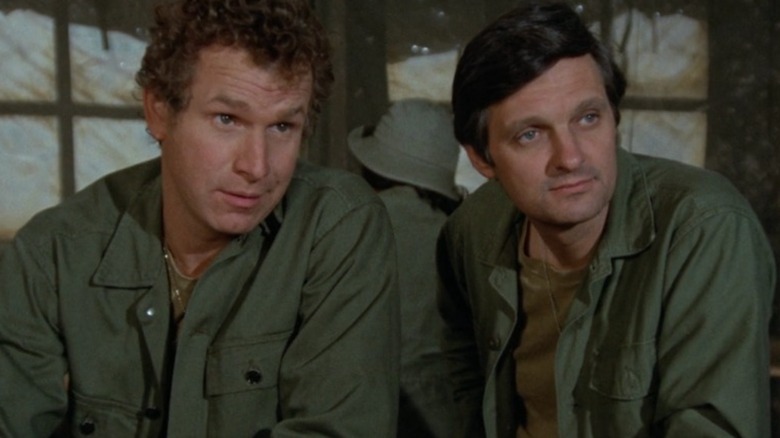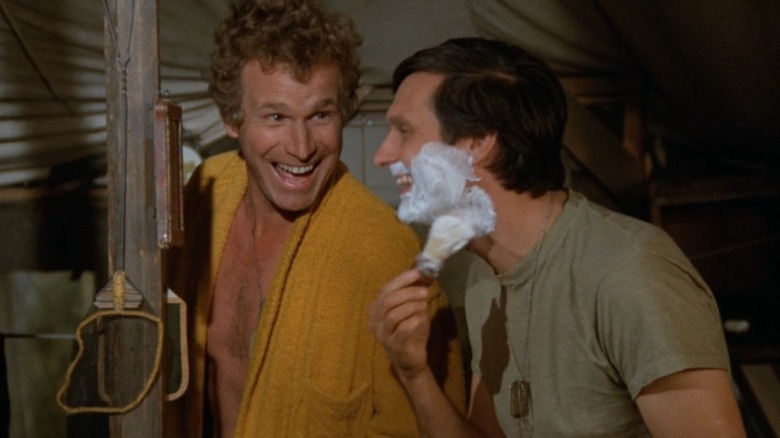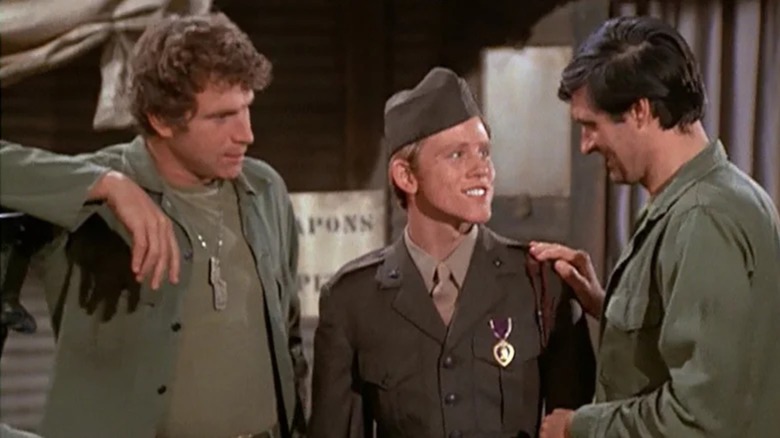One M*A*S*H Actor Was Especially Bad About Breaking Character
Comedic breaking: it's been around for pretty much as long as performances. Flip through classic TV channels and you'll find Rue McClanahan delivering her lines into the back of her hand to hide giggles in episodes of "The Golden Girls," Mary Tyler Moore barely suppressing her grin in"The Dick Van Dyke Show," and Horatio Sanz wiping away tears with Mickey Mouse waffles on "Saturday Night Live." Breaking seems like an unstoppable phenomenon, especially once more than one castmate well and truly gets the giggles, but it's also a surprisingly controversial one: for every person who laughs along with the actors, there seems to be another who thinks breaking is unfunny and unprofessional.
Larry Gelbart, who created the influential and long-running '70s sitcom "M*A*S*H," was apparently not into character breaks, and he told author Ed Solomonson that one actor in the show's ensemble cast did it more than any other. In an interview for "TV's M*A*S*H: The Ultimate Guide Book," the late, great writer said Trapper John actor Wayne Rogers dissolved into laughter more than most castmates on the show. "Wayne did [laugh at Alda]," Gelbart said, "and I was always telling him not to do it that much. There's nothing worse in a comedy routine than having the people doing it, laugh at it."
Wayne Rogers was always cracking up
Gelbart said that a cast member cracking up "seems to be a signal to the audience," presumably pushing them to laugh whether or not they actually want to. This take is pretty in line with Gelbart's ethos as a storyteller, as the writer also went on the record more than once to talk about how much he loathed the show's laugh track. "I always thought it cheapened the show. I always thought it was out of character with the show," he once told the Archive of American Television. When it came to Rogers, though, Gelbart said the late actor's laughter was totally authentic, and that his and other characters' in-show reactions could make audiences laugh "far more than because of a laugh track."
"It was genuine," he explained in Solomonson's book, in reference to Rogers. "Wayne's a pushover. I see Wayne at a party, he starts laughing across the room. I don't know if he's remembering something we did, or if he's anticipating what's possibly going to be said." That quick-to-laugh attitude makes Trapper one of the show's most winsome characters, and some of the best scenes in the show's first three seasons (Rogers left after the third) feature him and Alda hamming it up with open-mouthed peals of laughter, sometimes accompanied by an honest-to-god knee slap. Oftentimes, the laughter was clearly written into the script, meant to convey the pair's borderline manic response to the chaos of wartime. In the face of so much carnage, the show often reminded us that sometimes all Hawkeye and Trapper could do was laugh.
'It was a wonderful creative climate'
Gelbart, who died in 2009, may have sounded irked talking about Rogers' penchant for cracking up, but he actually went on to complement Rogers and the rest of the ensemble for their giddy approach to work. "Actually, everyone in the cast had a good sense of humor, and a really good sense of humor [is] essential in doing a series," he explained. When actors have so much to remember — lines, blocking, subtext, and emotion — Gelbart said that a good sense of humor was key. He continued:
"We used to sit around between takes and talk about the next scene...or a part of that script, and it was very instructive. It gave them a chance to ask questions further about what it was they were doing, and I could make some writing changes, as well. It was a wonderful creative climate – and good humor, which is a manifestation of good will, was the touchstone for it all."
Filming on "M*A*S*H" wasn't always a picnic — no wildly popular show that runs for 11 seasons would be — but stories of the show's behind-the-scenes creative environment remain inspiring to this day. Nurse Margaret actor Loretta Swit still talks about how she was essentially able to help craft her own storyline, while Alda and B.J. Hunnicut actor Mike Farrell spent part of a recent reunion podcast talking about how table reads for the show allowed for open feedback between writers and actors. While that type of semi-democratic storytelling seems to be much rarer these days, there are some parts of the "M*A*S*H" production that still feel timeless — like that one guy on set who just won't stop laughing.
You can laugh at "M*A*S*H" too: all eleven seasons are currently on Hulu.


